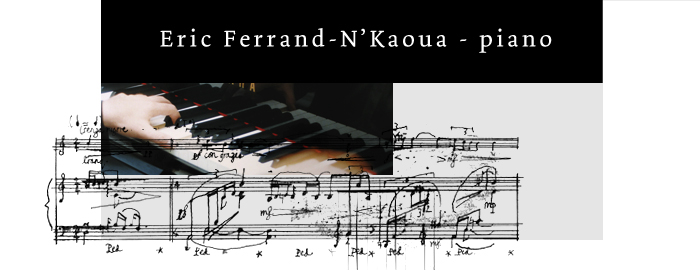A journey from the written to
the heard
Somewhere in between written,
heard, or played through all our bodies’ fibers, vibrates
a mysterious prism, sometimes so close that it turns painful, sometimes
so distant that one would do anything to feel its presence again;
this sonorous palpitation that transcends time and space, this
essential, though unspeakable language, is music.
Some music is indispensable to us at certain moments of our lives,
indifferent at others. Masterworks exist by their own but could
not live inside us without our commitment as a listener or as… an
interpreter.
Reacting to a work, making it ours in order to share it with others
with all the strength of a culture that has become unconscious,
of a craftsmanship that has shaped our nervous system, that is
our mission, freely assumed.
Is there a gene for music? Musicians turn on every zone of
the brain, say neurologists, movement, language, senses and emotions,
while they listen, make, or just even think about music. That’s
why there are as many types of musical behaviour as musicians,
even considering a single style or instrument, according to the
infinite combinations of individual backgrounds, feelings, ideas
and instincts.
So, what is music? Mp3 files that we share for free? Scores that
we store and never have time to read? All Mozart in 112 Cds on
a shelf, or 4 Gigabytes of Bill Evans? You are probably
closer to music if you are moved by a score you’ve just
sight-read for fun, or by a melody heard on the radio, than
if concerts only mean for you a conventional sonorous atmosphere,
and Mozart a frozen artificial scenery.
Nowadays, you have all the cybernetic means at your fingertips
to hear more about any music you wish, and start a dialogue with
it. Things have improved so dramatically since the time when
we used go to the library of the Conservatoire, closed at 5 pm,
impossible to borrow a score or a record…
Let’s suppose you are interested by, say, Johann Strauss,
father and son. In one click, you get to a thrilling visual summary
by their cousin Johann Mouse - alias Tom and Jerry. Or more seriously, by Georges
Enesco, Chostakovitch or
precisely by Mozart.
If your favorite interpreter is convincing enough, in a few minutes
he would sure be able to make you doubt the most widely admitted
concepts, or simply get you to the deep feeling you were longing
after.
EFNK
